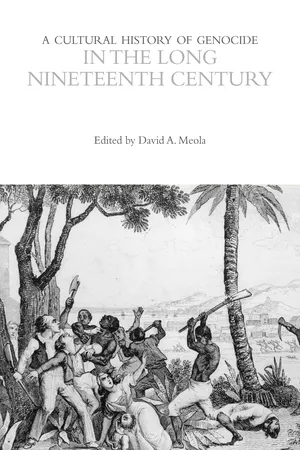
- 265 pages
- English
- PDF
- Available on iOS & Android
A Cultural History of Genocide in the Long Nineteenth Century
About this book
The long 19th century, approximately 1750 to 1918, was one of significant existential change for peoples across the globe. The beginning of this period saw the expansion of empires, and shortly thereafter, the Euro-American Enlightenment brought about calls for revolutions and the "rights of man". The events and ideas made way for empire and the creation of the nation-state. European states primarily concentrated their aggressive colonization in the Global South, bringing mostly white metropolitans and settlers into intimate contact with diverse African, Asian, and American populations. The inherent violence of imperialism eventually ushered in flashpoints of conflict, as well as indentured servitude, racial segregation, ecological destruction, and genocide throughout Europe's overseas empires. While communal destruction functioned as a central element of 19th-century genocides, colonial governments also used other methods to destroy indigenous life, such as forced assimilation, language adoption, religious instruction, and economic subjugation. Memories of these atrocities have since contributed both to systemic violence in subsequent decades, and to education about these events in the hope of genocide prevention. Yet for all of the violence, a spirit of humanitarianism developed alongside these vile actions that tried to reverse the policies of states and help the aggrieved.
Frequently asked questions
- Essential is ideal for learners and professionals who enjoy exploring a wide range of subjects. Access the Essential Library with 800,000+ trusted titles and best-sellers across business, personal growth, and the humanities. Includes unlimited reading time and Standard Read Aloud voice.
- Complete: Perfect for advanced learners and researchers needing full, unrestricted access. Unlock 1.4M+ books across hundreds of subjects, including academic and specialized titles. The Complete Plan also includes advanced features like Premium Read Aloud and Research Assistant.
Please note we cannot support devices running on iOS 13 and Android 7 or earlier. Learn more about using the app.
Information
Table of contents
- Cover
- Contents
- List of Illustrations
- List of Tables
- General Editor’s Preface Paul R. Bartrop
- Introduction David A. Meola
- 1 Causes Lauren Faulkner Rossi
- 2 Motivations and Justifications Adam Jones
- 3 Perpetrators Stefanie Kunze and Alex Alvarez
- 4 Victims Ashley Riley Sousa
- 5 Responses Dean Pavlakis
- 6 Consequences Adam A. Blackler
- 7 Representations Cathie Carmichael
- 8 Memory Jermaine O. McCalpin
- Notes
- Bibliography
- Notes on Contributors
- Index